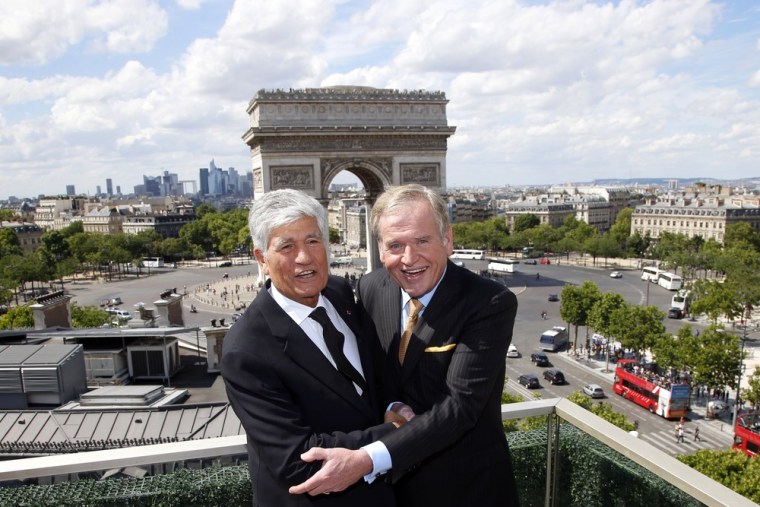The multi-billion dollar merger between advertising giants Publicis and Omnicom will create the world's largest ad agency but their competitors brushed off concerns about a more powerful rival on Monday.
Martin Sorrell, the chief executive of WPP, currently the world's largest ad agency, told CNBC that he was not quaking in his boots yet.
"In terms of size, at the end of the day, if you look at the geographies, it doesn't really create great scale except in the U.S. and obviously the regulators are going to take a good hard look at that," Sorrell told CNBC Europe's "Squawk Box."
The global advertising market began its week with news of the creation of the world's biggest firm in the sector, after France's Publicis and U.S.-based Omnicom announced at the weekend they were joining forces to form a group worth $35.1 billion, overtaking global leader WPP.
David Jones, chief executive of French advertising agency Havas, said he was "very surprised" by the merger, and questioned the rationale of the deal for clients and employees.
"It's clearly a very cleverly constructed deal and I think it makes huge sense for the two current CEOs and works for them, but I think you end up making two people happy and 130,000 [people] and many clients concerned and destabilized," he told CNBC's "Worldwide Exchange."
Jones said Havas wouldn't block the deal for anti-trust reasons.
Both WPP's Sorrell and Havas's Jones said a bigger agency wasn't what clients wanted, rather marketers wanted agencies that were more nimble, entrepreneurial and less bureaucratic.
Shares of WPP were up 2.38 percent on Monday morning, while Havas's shares were up 6 percent. Trading in shares of Pubicis would resume at 2.30 p.m. London time, when the U.S. market opened.
Analysts also questioned whether Omnicom and Publicis could execute on the merger.
Potential issues include how the firm will cope with its bases split between the U.S. and Europe, whether the two cultures can be combined effectively and potential conflicts of interest in terms of representing competing clients.
The firms will now collectively represent competing brands, including Coca-Cola and Pepsi, McDonald's and Taco Bell.
"Clients really have not been taken through the pros and cons of this in any great detail and it's going to be very interesting to see what happens," WPP's Sorrell said.
Mike Amour, CEO of Asia Pacific at advertising network Project Worldwide, said the merged firm could tackle this concern by being open and transparent with its clients.
"As long as the agencies are transparent and are upfront with their clients about potential conflict [the issue can be avoided]. This is not the first time this has happened in regards to clients from similar categories sitting under the same agency," he said.
(Read more: Publicis CEO: Digital, US rebound driving revenues)
Publicis's 71-year old CEO Maurice Levy and Omnicom's 60-year old CEO John Wren will run the merged group together for the first two-and-a-half years, after which Wren will take the reins.
"Time will tell if the cultures will click and whether clients and talent benefit - and how $500 million of synergies will be generated without job cuts. Co-CEOs is not an easy structure," Sorrell added.
"Having said all that I think it's a tremendous deal for Publicis. It's an extremely bold, brave and surprising move...but we'll have to see how this all plays out."
Changing with the times
The global advertising industry has been undergoing a rapid transformation in recent times with the rise of digital marketing. Major ad agencies have been snapping up digital marketing companies in emerging markets in recent years in a bid to compete.
The newly merged firm Publicis Omnicom Group could be better able to compete with global giant WPP, Project Worldwide's Amour said, especially in terms of pursuing business in India and China.
(Read more: 'Hand-to-hand combat' in advertising market: WPP CEO)
"It's a very bold move in regards to the very fast developing economies such as India and China. WPP has made strong inroads there over the past 20 years, Omnicom and Publicis have been slower in that regard, so this will accelerate their ambitions in these geographies," Amour said.
Publicis Omnicom Group is set to spend around $100 billion a year in marketing budgets for its clients, equivalent to 20 percent of the global media business, Reuters reported, which means the deal could be subject to scrutiny from antitrust regulators.
The deal is expected to be closed in the final quarter of this year, or the first quarter of 2014.
(Read more: This region is the world's fastest growing advertising market)
—By CNBC's Katie Holliday; Follow her on Twitter@hollidaykatie. CNBC's Holly Ellyatt contributed reporting to this story.
